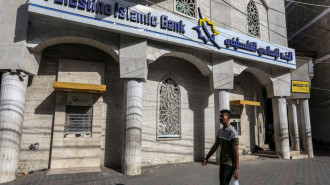Saudi oil pipeline attacks originated from Iraq, not Yemen: US
Saudi oil pipeline attacks originated from Iraq, not Yemen: US
The US has concluded that attacks in May on Saudi pipelines originated from Iraq, not Yemen earlier believed.
2 min read
Saudi's oil infrastructure was damaged in drone attacks [Getty-file photo]
A series of attacks on Saudi Arabia's oil infrastructure last month were launched from Iraq and not Yemen, as many had suggested, the Wall Street Journal reported on Friday.
Houthi rebels in Yemen claimed the drone attacks on 14 May, which hit two oil pumping stations and briefly shutting down the kingdom's East-West pipeline.
The pipeline lies closer to the Iraqi border than Yemen's, and does not have the same defensive missile systems in place, as there is in the kingdom's southern frontier.
This has led US officials to say they believe the operation was launched by militants in Iraq and not in Yemen, sparking fears that a "second front" has opened for Saudi Arabia.
Secretary of State Mike Pompeo has spoken to Iraqi officials, urging them to take action and prevent the country from becoming a launching pad for future attacks into Saudi Arabia.
Washington is already concerned by a series of attacks on US interests in Iraq, which are believed to have been carried out by militants linked to Iran.
It comes amid tensions between Iran and the US, with a series of attacks on shipping in the Gulf over the past month blamed on Tehran.
Houthi rebels have meanwhile carried out a string of rocket attacks on southern Saudi cities.
US officials told the Journal that the technology used in the pipeline attack were much more advanced than those known to be in the Houthis' arsenal.
"This poses questions about the Iraqi government's capacity to keep Iraq neutral in a regional crisis,” said Michael Knights, a senior fellow at the Washington Institute for Near East Policy, told the WSJ.
"[Iraq] President Barham Salih recently said that Iraq won't be used by America to attack Iran, but Iraq is already being used by Iran to attack its neighbours."
Despite it becoming clearer that the Houthis did not carry out the attacks, the Yemeni rebels still claimed responsibility leading Knights to view this as a sign the militants are closer to Tehran than believed.
"This indicates that they are not a temporary partner of Iran’s security sectors but rather a true proxy that takes actions against their own interests to benefit Iran, and provides support to other Iranian-backed militias," he said.
The UAE also reportedly downgraded its military presence in Yemen, believing the threat from Iran in the east is greater than that of the southern Arabian Peninsula.
Houthi rebels in Yemen claimed the drone attacks on 14 May, which hit two oil pumping stations and briefly shutting down the kingdom's East-West pipeline.
The pipeline lies closer to the Iraqi border than Yemen's, and does not have the same defensive missile systems in place, as there is in the kingdom's southern frontier.
This has led US officials to say they believe the operation was launched by militants in Iraq and not in Yemen, sparking fears that a "second front" has opened for Saudi Arabia.
Secretary of State Mike Pompeo has spoken to Iraqi officials, urging them to take action and prevent the country from becoming a launching pad for future attacks into Saudi Arabia.
Washington is already concerned by a series of attacks on US interests in Iraq, which are believed to have been carried out by militants linked to Iran.
It comes amid tensions between Iran and the US, with a series of attacks on shipping in the Gulf over the past month blamed on Tehran.
Houthi rebels have meanwhile carried out a string of rocket attacks on southern Saudi cities.
US officials told the Journal that the technology used in the pipeline attack were much more advanced than those known to be in the Houthis' arsenal.
"This poses questions about the Iraqi government's capacity to keep Iraq neutral in a regional crisis,” said Michael Knights, a senior fellow at the Washington Institute for Near East Policy, told the WSJ.
"[Iraq] President Barham Salih recently said that Iraq won't be used by America to attack Iran, but Iraq is already being used by Iran to attack its neighbours."
Despite it becoming clearer that the Houthis did not carry out the attacks, the Yemeni rebels still claimed responsibility leading Knights to view this as a sign the militants are closer to Tehran than believed.
"This indicates that they are not a temporary partner of Iran’s security sectors but rather a true proxy that takes actions against their own interests to benefit Iran, and provides support to other Iranian-backed militias," he said.
The UAE also reportedly downgraded its military presence in Yemen, believing the threat from Iran in the east is greater than that of the southern Arabian Peninsula.







 Follow the Middle East's top stories in English at The New Arab on Google News
Follow the Middle East's top stories in English at The New Arab on Google News

![Trump Arizona [Getty]](/sites/default/files/styles/image_330x185/public/2178637365.jpeg?h=1ea5e9ce&itok=d1WNcfPB)
